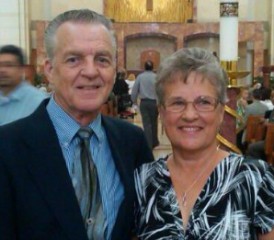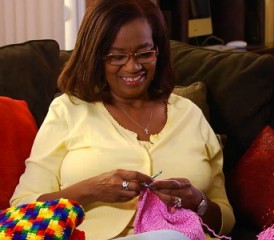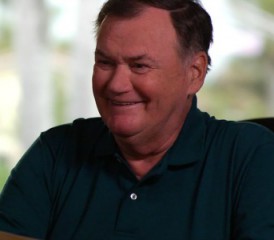Survivor Stays Aggressive in Fight against Pleural Mesothelioma

Fact Checked | Written by: Tim Povtak | Last Update: 10/24/2024 | 6 Min Read
Sydney R. never forgot what she learned fighting for her life as a child more than 60 years ago, framing her perspective today as she battles malignant pleural mesothelioma.
Don’t ever concede.
“If you’re unlucky enough to get this disease (mesothelioma), then you better put your big-girl clothes on, and come ready for a fight,” she said recently from her home in Katy, Texas. “It’s the only way you’re going to make it through. You have to be aggressive.” Her last name is being withheld over privacy concerns.
Sydney, 70, was only 9 years old when she almost died from acute rheumatic fever, an inflammatory disease that was killing 10,000 children annually in America. It left her hospitalized for six weeks, while her parents prayed and the nurses cried at her bedside. They were about to lose another one.
A damaged heart was the best they should hope for, if she even survived, according to the doctors.
Sydney overheard the chatter, but she fought it defiantly — a tough little girl who battled back, eventually went home, and stubbornly rejected the doctor’s orders to rest in bed for another few weeks.
“I still remember telling my dad back then, ‘If I can’t go out and play, I might as well not even be here,'” she recalled. “And I turned out OK. It taught me to always rely more on myself and on God, than on any other humans. Doctors don’t have all the answers. They aren’t on some pedestal. I’m a fighter. I always have been. And I always will be.”
Diagnosis Came with Gloom and Doom
Sydney was diagnosed with pleural mesothelioma in June 2011, 18 months after she first knew something was wrong.
She was given 12-18 months to live by a cancer center in Texas, which also told her there was little she could do to change the inevitable outcome. The news stunned her, but it also sparked her defiant side, and a determination to beat the odds once again.
She learned everything she could about mesothelioma, challenging doctors, their treatments, their beliefs and their goals. She questioned every decision they made, and got second and third opinions. She hurt feelings, but it didn’t hurt that her husband, Ed, was a retired anesthesiologist who was well-versed in the health care industry.
They worked it together. The man she has known for 57 years, shared four children, 12 grandchildren and two great-grandchildren with, provided the perfect complementary piece.
This was no time to say goodbye.
Sydney Kept Asking Questions
They explored clinical trial options. They debated alternative treatment plans. She underwent numerous procedures, multiple rounds of chemotherapy and radiation. She had a pleurodesis to treat the pleural effusions, but that wasn’t enough. She underwent the more aggressive pleurectomy to remove the cancerous lining around her lungs, but that wasn’t enough, either.
“I’m an independent, outspoken person, and that gave us an advantage,” she said. “I have too much to live for, and I certainly wasn’t ready to say ‘You win, mesothelioma.’ That would not have been me.”
When the PET scan in November 2012 revealed more cancer, she underwent a pneumonectomy, the most aggressive surgery available to remove her entire right lung and a piece of her diaphragm.
But unlike most patients, she didn’t need the respirator after the surgery. She also pulled off the oxygen hose much quicker than most. She started walking sooner than anyone expected, wearing down a path in the hallway of the critical care unit. She checked herself out of the hospital early.
That was seven months ago. She has now passed the two-year survival mark.
Attacking the Mesothelioma
“We’ve attacked this monster (mesothelioma) with every resource we could find,” Sydney said. “I really feel like we’re striking a blow against mesothelioma. At the start, we really debated about doing all this because I did not want to become a burden to my family.”
Instead, she has become an inspiration to many.
Before mesothelioma, Sydney led an especially active lifestyle. She played softball with the grandkids. She cut the grass — with a push mower. She hiked, and she biked. She had a workout routine of a considerably younger woman.
“One of my grandkids said to me after the last surgery, ‘That’s OK, Grandma. I like dominoes, too. We can all slow down,'” she said. “We don’t talk gloom and doom. I heard enough of that before. We talk about how great the next day can be. We humor each other, too.”
Grandchildren Inspire Her
One of her grandchildren saw the large lump on her back in March, complications from a broken wire inside of her after surgery, and told her it looked like a golf ball. He asked about painting a face on it, along with adding a bow.
Another grandchild researched an experimental study at Rice University, where cancer tumors were being destroyed with the help of magnets that could better target the bad cells. She didn’t have the heart to tell him it wouldn’t work with mesothelioma.
She has one grandchild active in student ministries at Texas A&M, another playing football at the United States Air Force Academy, and a third training to be a veterinarian at Texas Tech. Two others already graduated and became teachers.
“I want to live long enough to see what all the grandkids grow up to become,” she said. “I know now that people can survive and have a good life after surgery. When people tell me, it’s terrible what I’ve been through, I tell them, ‘No, it’s not. I’m still alive.’ And I like the new normal. I’m lucky that mine was caught early enough. “
No Giving Up
Sydney has been close to cancer before. Her father died of lung cancer at age 58. Her brother died of lung cancer, too, in 2008. The siblings grew up in Texas City, Texas, where the nearby chemical plants and shipyards — both filled with asbestos products — are the likely reason for the high rate of respiratory issues among residents for decades.
She never worked closely with asbestos, which is the primary cause of mesothelioma cancer, but she believes the secondhand exposure caused the cancer. And she has nothing but praise for the medical care she received in Houston, particularly from noted surgeon Kamal Khalil, M.D., and oncologist Gury Doshi, M.D.
“It’s bad enough to get this, and it changes things, but it doesn’t have to be the death sentence a lot of people think this is,” she said. “I’d advise others to push the envelope looking for answers. I know if it comes back, my doctors have a few more things they can try. I’ll fight this thing forever.”





